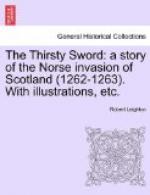Turning along a narrow path that led upward to the head of the bank, she followed the course of a little stream whose pure water was now turned into icy crystals. As she gained the level height the wind blew her hair about her pale and beautiful face. She drew her hood over her head and turned inland. To the south the giant fells of Arran, shrouded in snow, stood out white and distinct against a steel-blue sky, with the wan moon above them. But the ground that Aasta trod was bare and hard, and the drifted snow lay only in the deeper hollows crisp as ice. She crossed the Great Plain beside the Seat of Law, until she came to the wooded shores of Loch Ascog. She observed that the ruffled water of the little lake was of a deep blue, and she thought of the weird belief of that time which held that those waters claimed once every year a new victim, and that they only assumed that dark-blue colour in token of a coming death.
She looked upon Ascog Mere with a superstitious dread, for the people of Bute believed that it was a place of punishment for unhappy spirits, who might often be heard wailing in the dismal morass about its margin. She heard such a wailing even now, though perhaps it was but the whistling of the wintry wind among the frozen reeds, or the tinkling of the ice that was gathering in a film at the water’s verge.
Hastening her steps, she sought the shelter of the tall fir trees, and made her way to the southern point of the lake that she might reach the western shores of the island, and so take a fisher’s boat across to Gigha by the same easy course that Kenric had taken with her three months before. The journey must now be taken alone, for she meant that the vengeful work she contemplated should be secret, and that Earl Kenric should be rid of his dangerous enemy without knowing by whom or by what means Roderic had been slain.
Scarcely had Aasta emerged from among the trees and crossed towards the lake when she heard the beating of footsteps upon the hard ground. She stood still and listened. Nearer and nearer the footsteps advanced, and presently at the top of a bald knoll in front of her there appeared the tall figure of a man. He was covered by a seaman’s great cloak, which he held partly over his face to shield him from the cutting wind. He came rapidly towards her, and when they were but a few paces apart he drew back his cloak, revealing his long red beard.
“Roderic of Gigha!” cried Aasta recoiling a step and feeling for her dirk, as she recognized the man she had set out to slay.
“Ay, Roderic it is,” said he smiling grimly. “And methinks, fair damsel, that you are the very same who so cunningly escaped from my ship over at Arrochar — the same also who fought so bravely against me at Largs. By the saints, my pretty one, but you are a most courageous maiden; much do I admire you, and fain would I know you better.
“Nay, be not afraid of me,” he added as he saw her draw back from him, “I will not hurt you.




